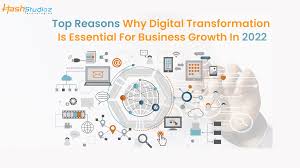Digital transformation refers to the integration of digital technologies into various aspects of an organization's operations, processes, and services to drive significant changes and deliver value to customers, employees, and stakeholders. It involves leveraging digital technologies such as cloud computing, big data analytics, artificial intelligence, the Internet of Things (IoT), and automation to improve efficiency, agility, innovation, and customer experience.
Key aspects of digital transformation include:
- Technology Adoption: Digital transformation involves adopting and leveraging emerging technologies that are relevant to the organization's industry and goals. This may include cloud-based infrastructure, data analytics platforms, AI-powered solutions, digital communication tools, and automation systems. The aim is to enhance operational efficiency, streamline processes, and enable data-driven decision-making.
- Process Optimization: Digital transformation often involves rethinking and redesigning existing processes to take advantage of digital technologies. This may include automating manual tasks, digitizing paper-based processes, and implementing workflow automation. The goal is to improve efficiency, reduce errors, and enable faster response times.
- Customer Experience Enhancement: Digital transformation focuses on enhancing the customer experience by leveraging digital channels and technologies. This may include developing user-friendly websites, mobile apps, and self-service portals, implementing personalized marketing and customer relationship management (CRM) systems, and using data analytics to gain insights into customer preferences and behavior.
- Data-Driven Insights: Digital transformation emphasizes the collection, analysis, and utilization of data to drive decision-making and improve business outcomes. This involves implementing data analytics tools and platforms to gather insights, identify patterns, and make predictions. Data-driven insights help organizations better understand their customers, optimize operations, and identify new business opportunities.
- Cultural Shift: Digital transformation often requires a cultural shift within the organization. This involves fostering a mindset of innovation, agility, and continuous learning. It may require changes in leadership style, employee training and upskilling, and creating a collaborative environment that encourages experimentation and embraces change.
Digital transformation is driven by the need to adapt to evolving market dynamics, changing customer expectations, and technological advancements. Organizations that successfully undergo digital transformation can gain a competitive edge, increase operational efficiency, improve customer satisfaction, and capitalize on new business opportunities in the digital age. However, digital transformation is an ongoing process that requires strategic planning, investment in technology and talent, and a commitment to embrace change and innovation.

